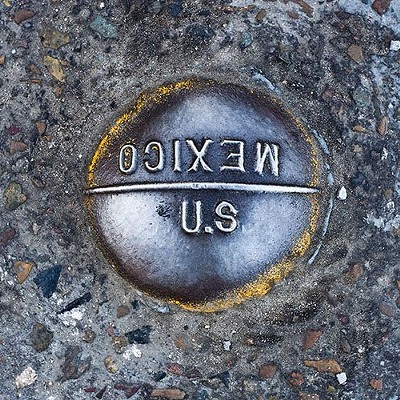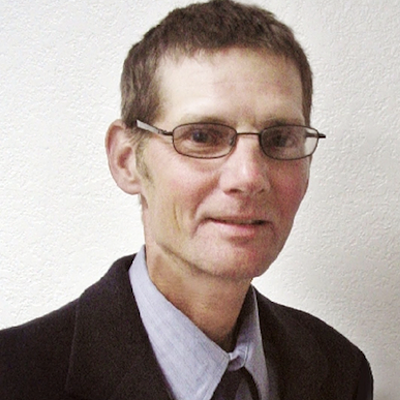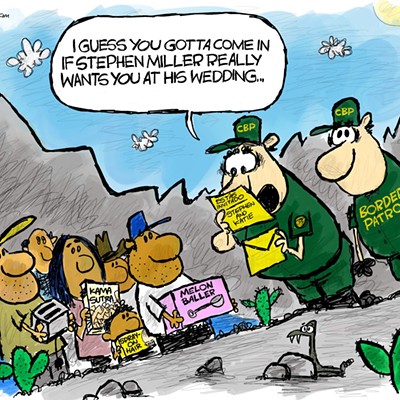The cover story in the June issue of Soldier of Fortune has officials at the Tucson Sector of the U.S. Border Patrol seething.
For good reason. The sector appears to have been slammed by a gonzo journalist with a rich imagination.
The story quotes a Tucson Sector Special Response Team commander as saying, "80 percent of the people on the (Tohono O'odham) reservation smuggle aliens, dope or both. That's not bias, it's just a fact. Most everybody out there has been arrested at one time or another for smuggling, domestic abuse, assault, murder, that kind of stuff."
Ron Colburn, an assistant chief with the Tucson Sector of the U.S. Border Patrol, told the Weekly that the Soldier of Fortune cover story is one of the worst public-relations disasters he has ever experienced related to a special ops unit.
Soldier of Fortune, generally regarded as an action strip for military cross-dressers and wannabe mercenaries, highlighted the Tucson Sector's no-nonsense, elite Special Response Team in an article titled "Border Patrol's Desert Rats," revolving around field operations on the Tohono O'odham Reservation southwest of Tucson.
"I want to say this first," said Colburn. "This article in no way represents the views or positions of the hard-working, dedicated men and women of the U.S. Border Patrol."
What the story does represent, said Colburn, maintaining his calm, is a writer taking liberty with the facts.
Colburn said the article reminds him of those old Western pulps that were put out for the benefit of easterners around the end of the 19th century and were full of raw-boned, gunslinger shoot-em-up stories.
The article describes the Organ Pipe National Monument as "a dope-packer's dreamland" because federal regulations prohibit off-road vehicular traffic, including patrol agents. SRT Commander Brian Brown is quoted by Bartlett as saying, "The locals [read: Tohono O'odham] apparently take full advantage of it."
The southern boundary of the monument is positioned on the U.S.-Mexico international border. The monument's western boundary touches the vast Sonoran Desert lands of the Tohono O'odham Nation.
Virginia Kice, a public information officer for the western region of the INS, said that Commander Brown's purported statement about 80 percent of the people being smugglers is "outrageous. It even borders on being racist."
Colburn, who is one of six assistant chiefs at the Tucson Sector, which spans a 187-mile border with Mexico, told the Weekly that one of the co-authors of the article, Jim Bartlett, admitted embellishing some of the statements attributed to Brown about the Tohono O'odham Nation.
"Bartlett told us he was writing for the readership of Soldier of Fortune, which likes a lot of fast-moving, colorful action," said Colburn. "Bartlett even told us he was writing the article to be sure Soldier of Fortune would buy it. ... He told us he wanted to make sure he got his $2,500 paycheck."
Colburn said he didn't talk with Bartlett personally and wasn't sure specifically who at the sector was actually in contact with him.
The Weekly attempted unsuccessfully to contact Bartlett through the magazine's editor to gather more specifics about the story and statements attributed to Brown. The Weekly was, however, able to contact Brown, who has been reassigned to regular duty as a field agent on the midnight shift at the Tucson Station.
The soft-spoken patrol agent told the Weekly that many of the comments attributed to him were gross misrepresentations.
"I never made a statement to [Bartlett] saying, '80 percent of the people on the reservation were smuggling aliens and dope,'" said Brown. "What I said was that of the people we encounter smuggling, 80 percent of them are Indians. My statement was not meant to be in reference to the population of the reservation as a whole."
Brown said that Bartlett came into the station with a few advance copies of the magazine back in April and was "real happy--passing them out to everyone.
"I looked at the article and told him he just terminated our program and screwed me big time. I told him it was really going to hurt us," said Brown. "I don't think Bartlett was attempting to be malicious with our program or with me. He apologized to me and wrote a letter of clarification to Soldier of Fortune, which I hope will appear in the next issue. But the damage is done."
Damage was done, indeed. Henry A. Ramon, vice chairman of the Tohono O'odham Nation, said he was saddened by some of the statements contained in the article. "We have a very close working relationship with the upper levels of the border patrol," said Ramon. "This article was unfortunate, but it won't ruin our relationship with the Border Patrol.
"From time to time," said Ramon, "we have problems with the younger agents who are unfamiliar with our customs and culture. They need training for the young agents to teach them our ways ... the way we respect the land and all living things. We are working with the upper levels [of management] to resolve many of these things.
"When something goes wrong, the Border Patrol sends someone down to talk with us right away. They want to work with us, and we need them to help us with some of these [border crossing] problems here," said Ramon.
Brown provided the Weekly a copy of Bartlett's letter of correction, which reads in part, "Regarding the quote 'About 80 percent of the people on the reservation are smuggling aliens, dope or both.' What was said was, '80 percent of people we arrest on the reservation for smuggling aliens, dope or both are Indians.' As pointed out, economic conditions have not helped the smuggling problem on reservation land despite the persistent efforts of various agencies and tribal government. It must be stated that the Tohono O'odham Nation Police patrol the rugged outback with the same dedication as their Border Patrol counterparts, all the time facing the same risks and perhaps more."
Jim Bartlett responds:
I was a bit surprised and frankly insulted when this article was brought to my attention. The quotes Mr. Colburn claims were untrue indeed exist, and I quoted them exactly. Agent Brown at the time was very frustrated by the behavior of the upper echelons at USBP and was speaking very candidly about the situations he was facing. The remarkable thing isn't so much the quotes I used, but more the quotes I didn't attribute to him. At one point I said, "Brian, I can't let you commit professional suicide on the pages of SOF." It was out of that situation that I agreed to write the so-called clarification. When he says that that what I wrote was a gross misrepresentation, I can only believe that he was pressured into saying that to keep his job. Brown is an outstanding officer, and I didn't want to be responsible for his demise. It was a case of protecting my source.
It was Ron Colburn who introduced me to the slavery rackets that take advantage of the immigrant situation. It was one of the better interviews I have ever conducted with a federal officer. Then, after the second piece ran, both he and spokesman Rene Noriega called me down for a meeting. Colburn in particular was very nervous and very solicitous. They explained their fears about a backlash with the Tohono O'odam peoples and basically asked me to cover for them, which, in the interest of seeing Brown keep his job, I did.
What it really boils down to is with what I have on tape, I didn't need to invent quotes. I had a disgruntled agent spilling the beans in a big way. What really stings is that I covered for Colburn and he turned around and publicly slandered me professionally.
What I see with this whole situation with the Tohono O'odham is a senior Border Patrol agent in a panic. At the end of it all, the Tohono O'odham representatives weren't all that upset about it and went on with their lives. I doubt it would have even come to their attention if Colburn hadn't brought it to them. Then, he runs hither and dither, throwing bones. When all was said and done, I'm sure he went back to his air conditioned office and closed his file on it.












